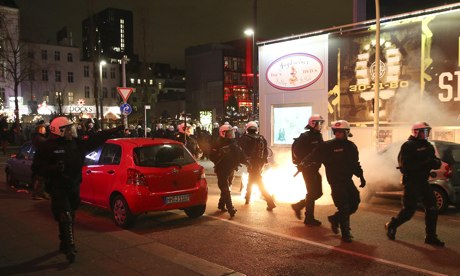Warum nicht resigniert merkel???
We are watching with concern the events. demonstrators' rights should be given immediately.
Hamburg residents have clashed with police in what is the most violent protest in years, with scores injured, after more than 7,000 took to the streets to protest plans to evict squatters from an old theater building, which is a leftist cultural center.
Police and protesters give conflicting figures, putting the number of participants anywhere from 7,000 to 10,000 people, with more than 100 policemen and a yet unspecified number of protesters injured in Saturday’s civil unrest.
Police said that some 4,000 of the protesters were from extreme left-wing groups. The violence involved stone and bottle-throwing, firecrackers and smoke bombs. Police responded with pepper spray and water cannon.
What eventually led to an explosion in violence was caused by the sale of the left-wing Rote Flora cultural center by local authorities to a developer. Some squatters have been occupying the premises for 20 years now.
It is said that an escalation took place soon after the beginning of the event in the afternoon, when some protesters started attacking police officers, although the atmosphere at the start was more peaceful and even festive, with confetti everywhere, as well as families seen with children.
All the while, the thousands of protesters shouted that “the city belongs to everyone,” one of their main slogans.
All the while, the thousands of protesters shouted that “the city belongs to everyone,” one of their main slogans.
But as the rally in front of the Rote Flora got going, police showed up to clear away people with batons and a water cannon, their spokesman telling Deutsche Welle that “there was a mood of aggression from the outset,” adding that “we came under serious attack. It has become more violent than anything we have experienced in a long time.”
“Through the overwhelming use of batons, pepper spray and water cannon, there were numerous injuries,”said the organizers.
“Through the overwhelming use of batons, pepper spray and water cannon, there were numerous injuries,”said the organizers.
Those suspected of being the initial trouble-makers have been arrested – there were over 20 detentions on suspicion of breaching the peace.
The streets afterwards showed signs of much chaos, with police cars smashed along with various buildings, including the office of the Social Democrat party. There were broken glass fragments and road signs having been folded over as well as stones literally torn from the pavement to be used as weapons.
The streets afterwards showed signs of much chaos, with police cars smashed along with various buildings, including the office of the Social Democrat party. There were broken glass fragments and road signs having been folded over as well as stones literally torn from the pavement to be used as weapons.
Zeit Online has reported, citing a non-government organization, that about 500 protesters being injured, 20 of them seriously. However, this information cannot be independently verified.
The cultural center’s squatting history dates back to 1989, when the Schanzenviertel area’s Rote Flora center was first occupied. Since then, its reputation as the central point for leftist rallying has been further cemented.
But the public anger itself had also to do with the wider issue of migrant and refugee rights, including those of the squatters at a run-down apartment block in Hamburg’s Reeperbahn area – also the city’s red-light district, which contains the so-called Esso Houses. The buildings, also often home to Germany’s Lampedusa refugees, were evacuated last weekend because of their poor condition.
After the initial chaos at the Rote Flora had subsided, the crowds migrated toward the Reeperbahn, where they were chased around the streets by the police.
But the public anger itself had also to do with the wider issue of migrant and refugee rights, including those of the squatters at a run-down apartment block in Hamburg’s Reeperbahn area – also the city’s red-light district, which contains the so-called Esso Houses. The buildings, also often home to Germany’s Lampedusa refugees, were evacuated last weekend because of their poor condition.
After the initial chaos at the Rote Flora had subsided, the crowds migrated toward the Reeperbahn, where they were chased around the streets by the police.


























